Thomas James Richards, Diaries, Transcript Vol. 2 - Part 22
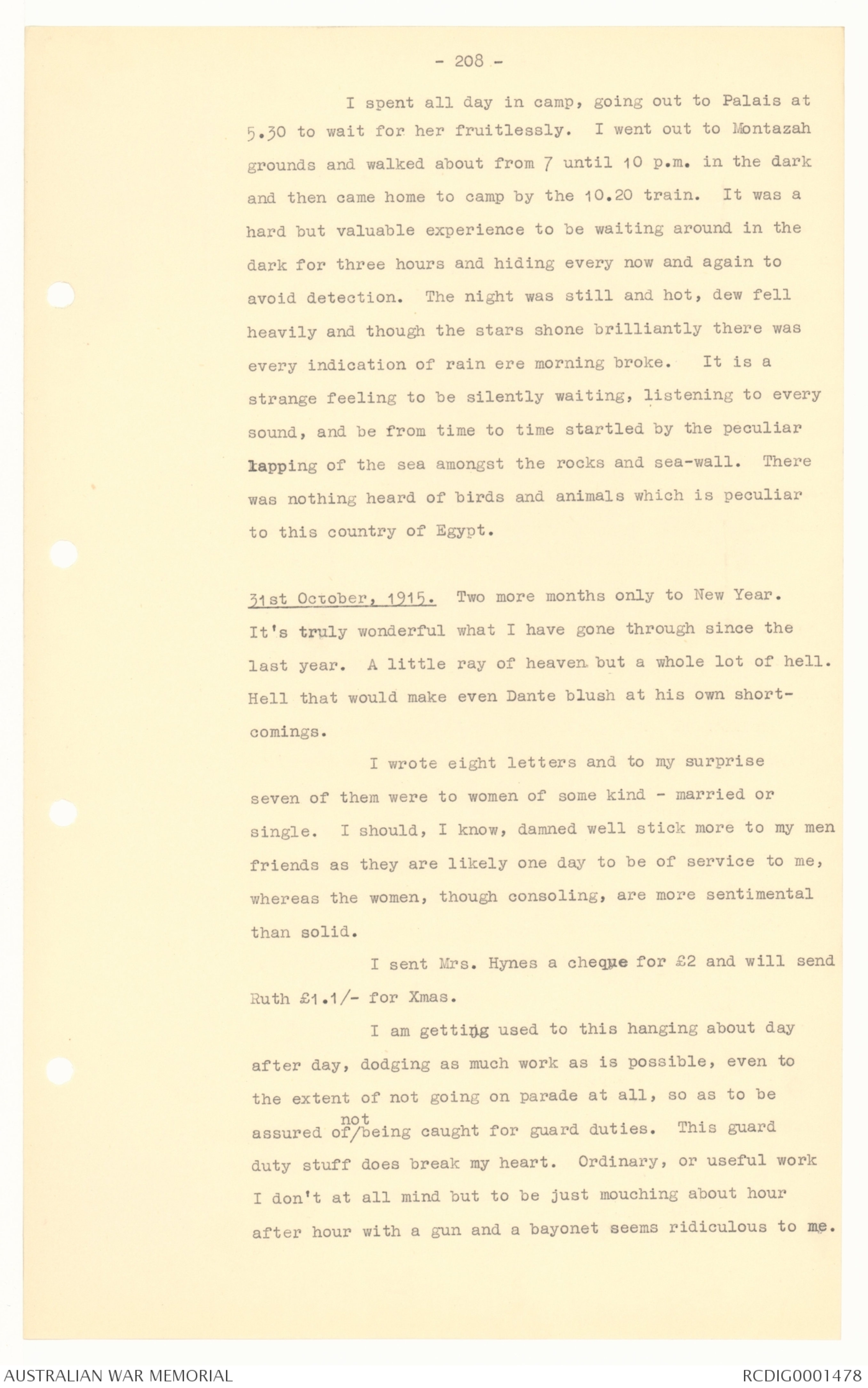
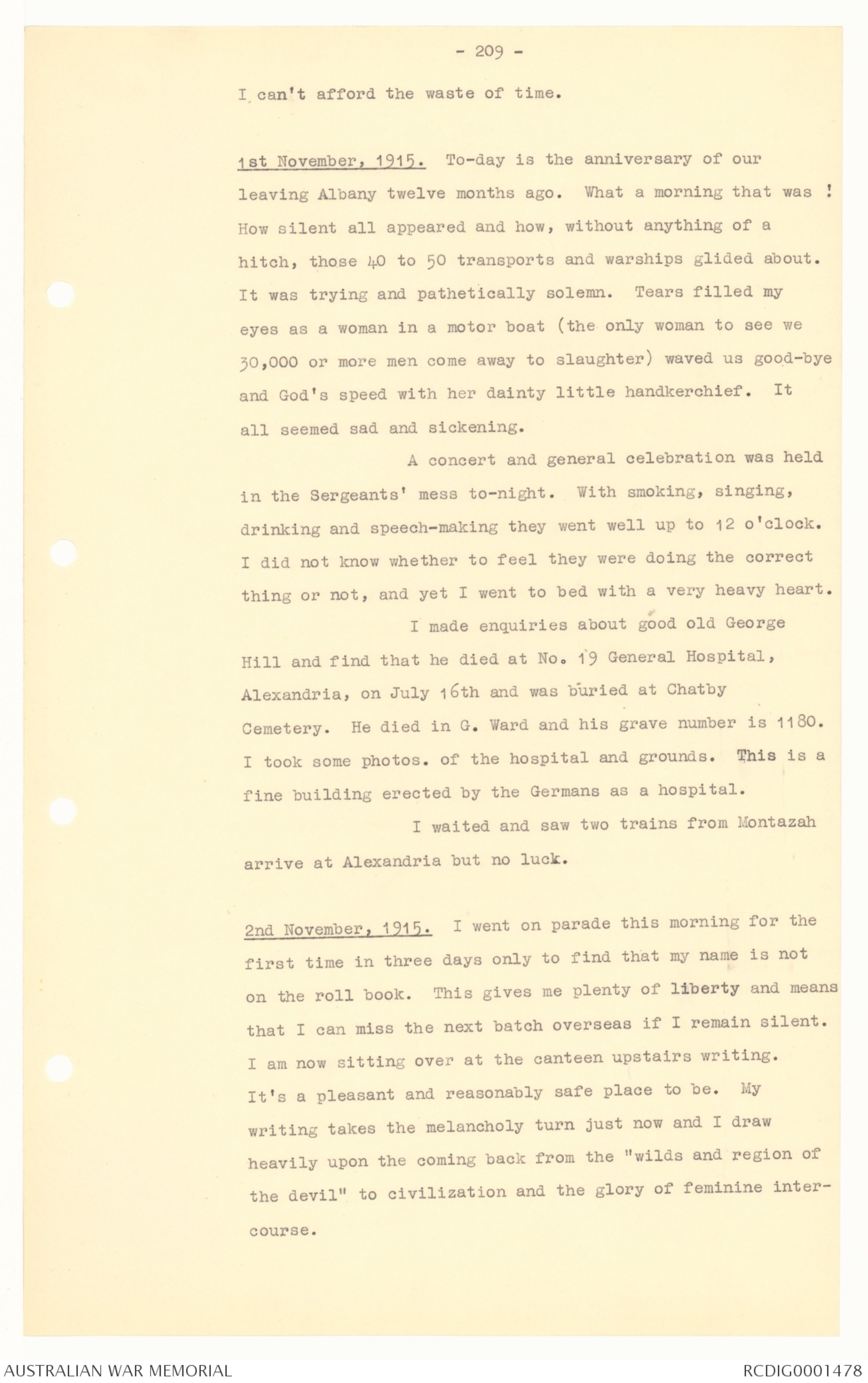
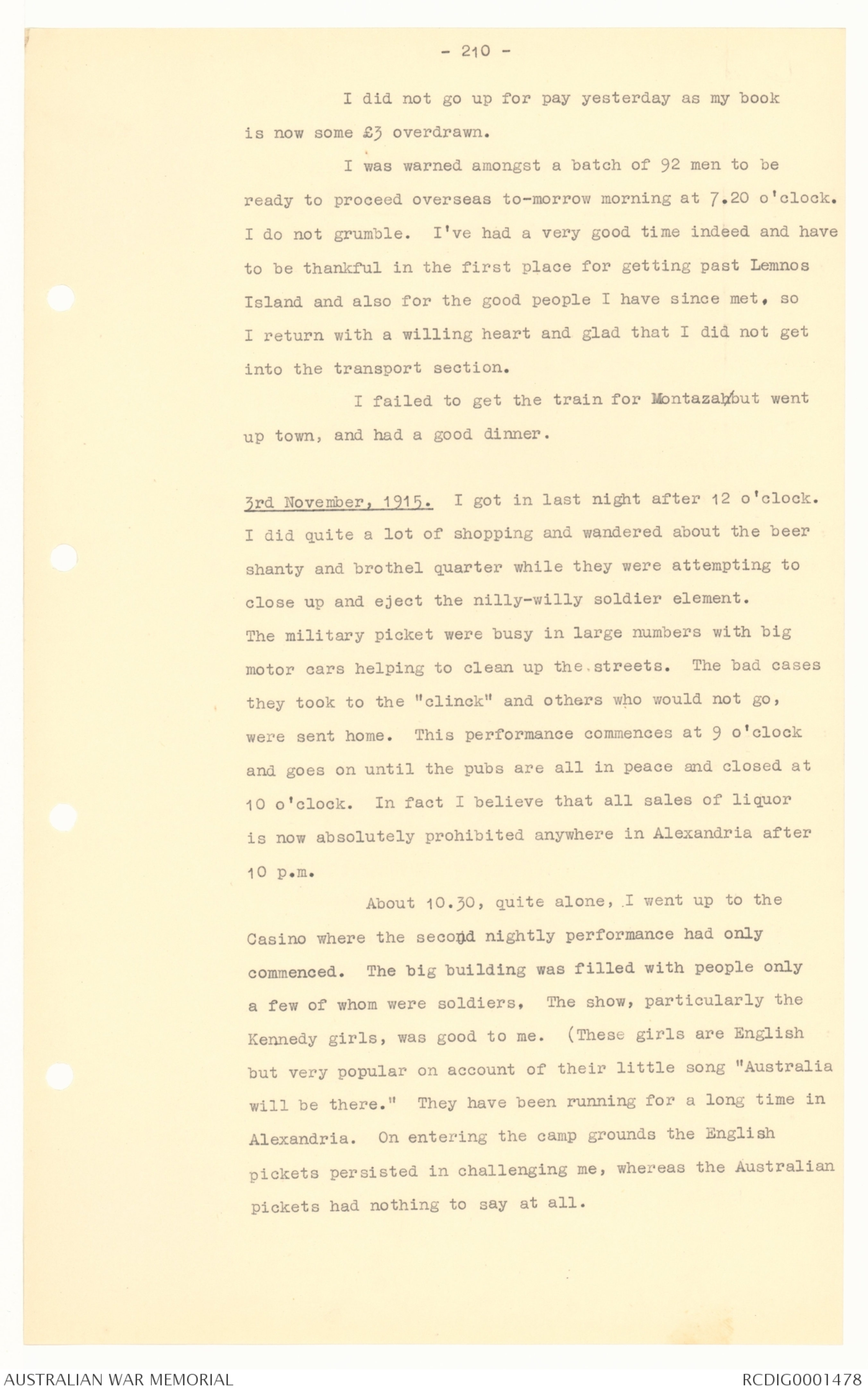
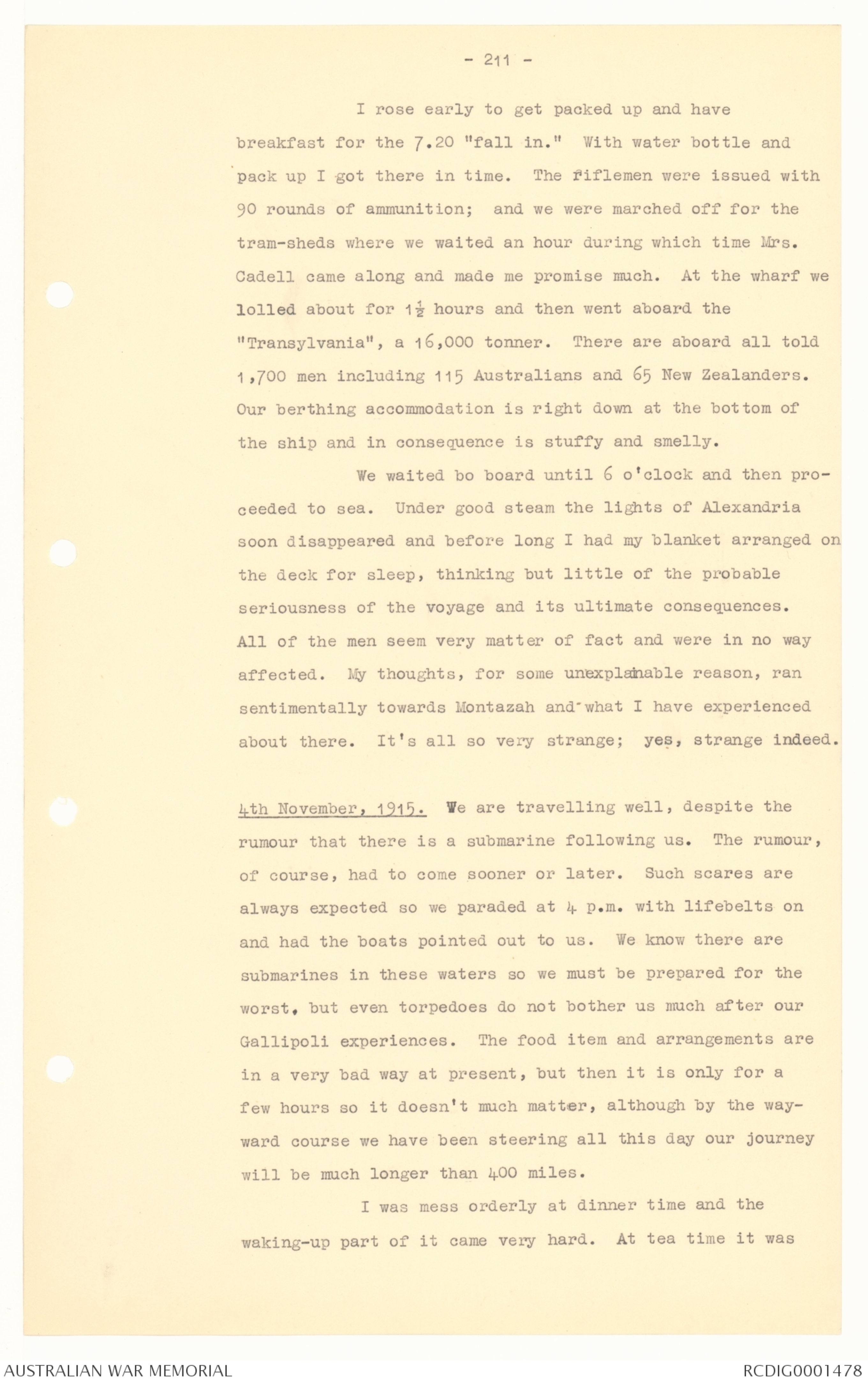
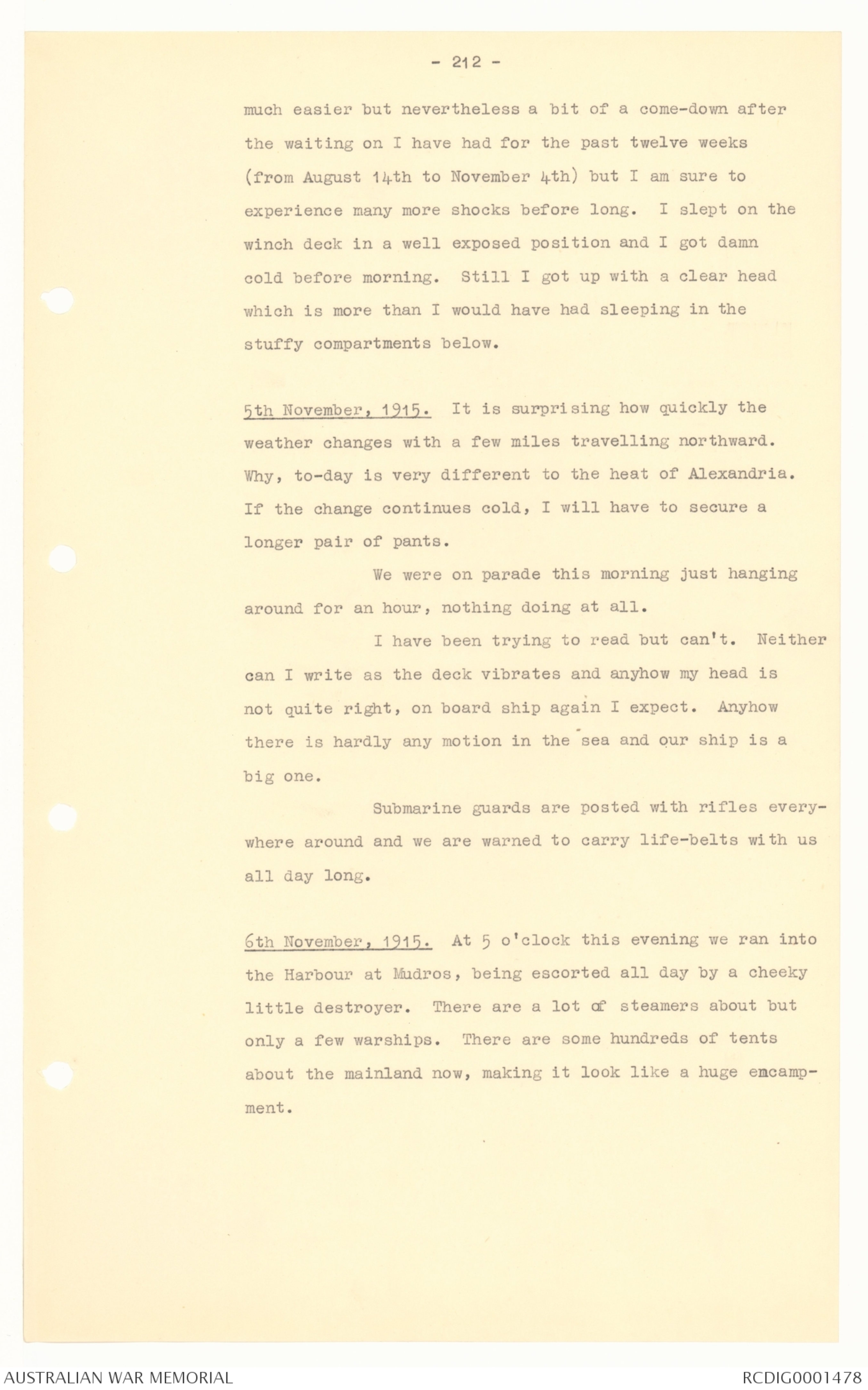
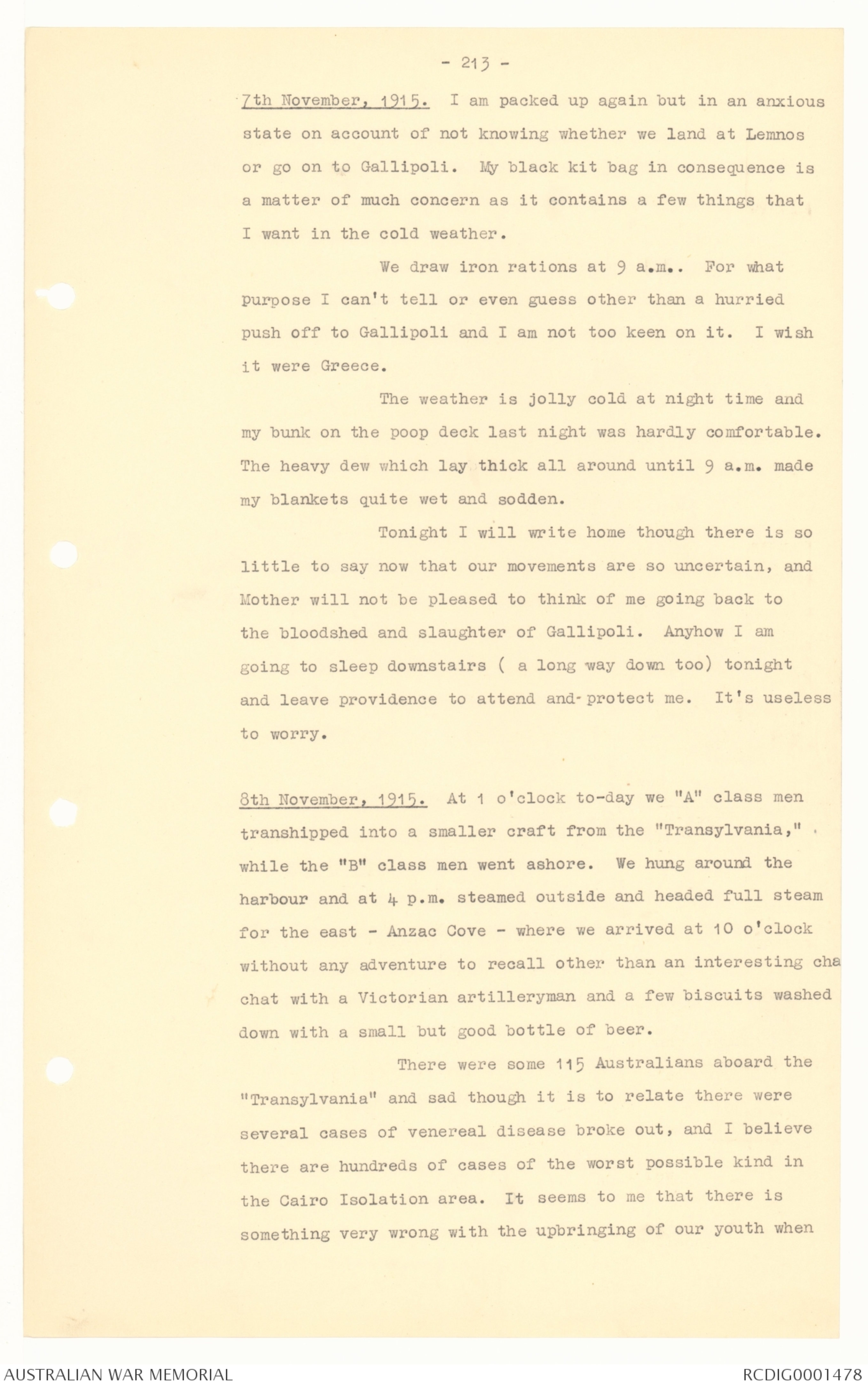
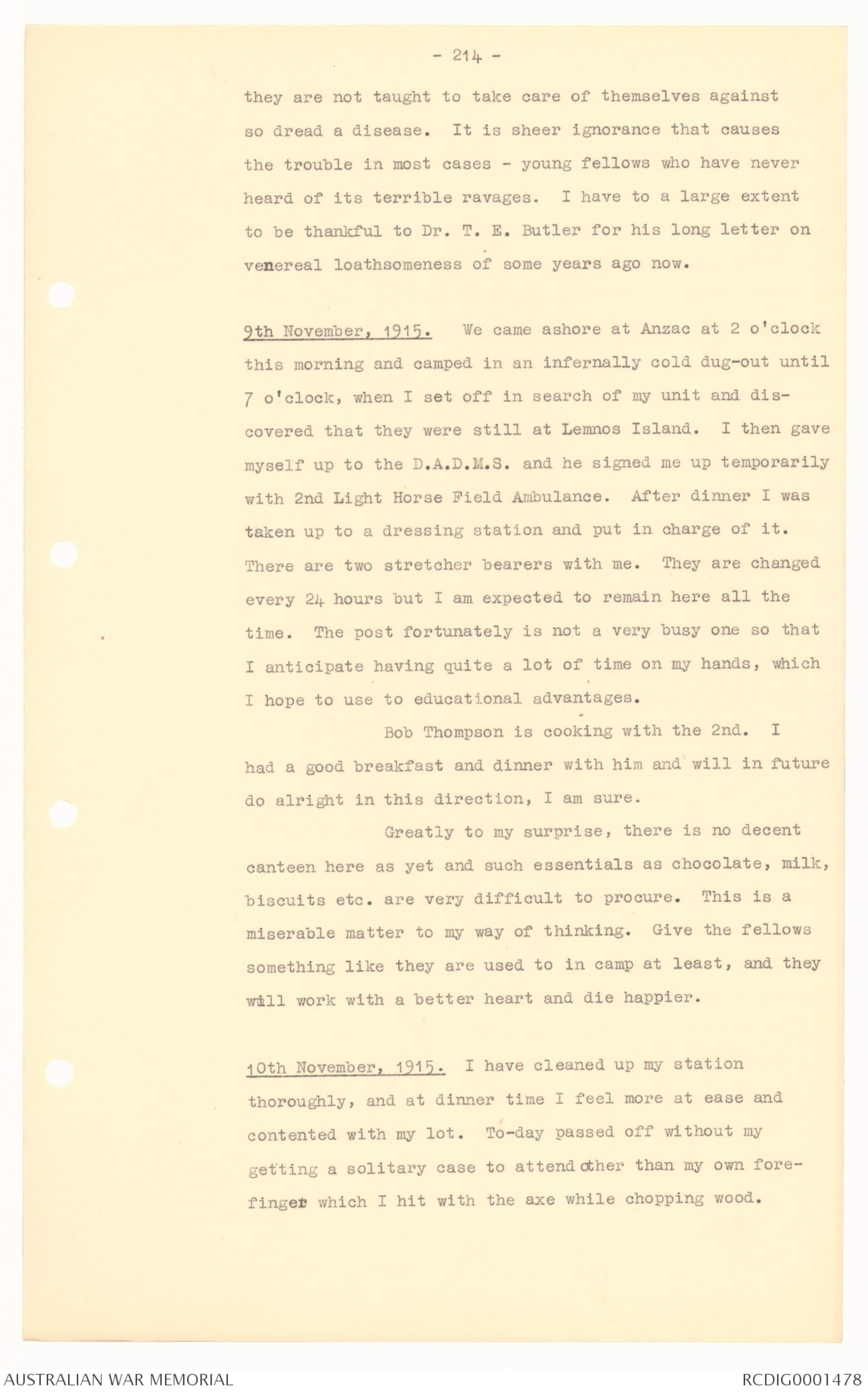
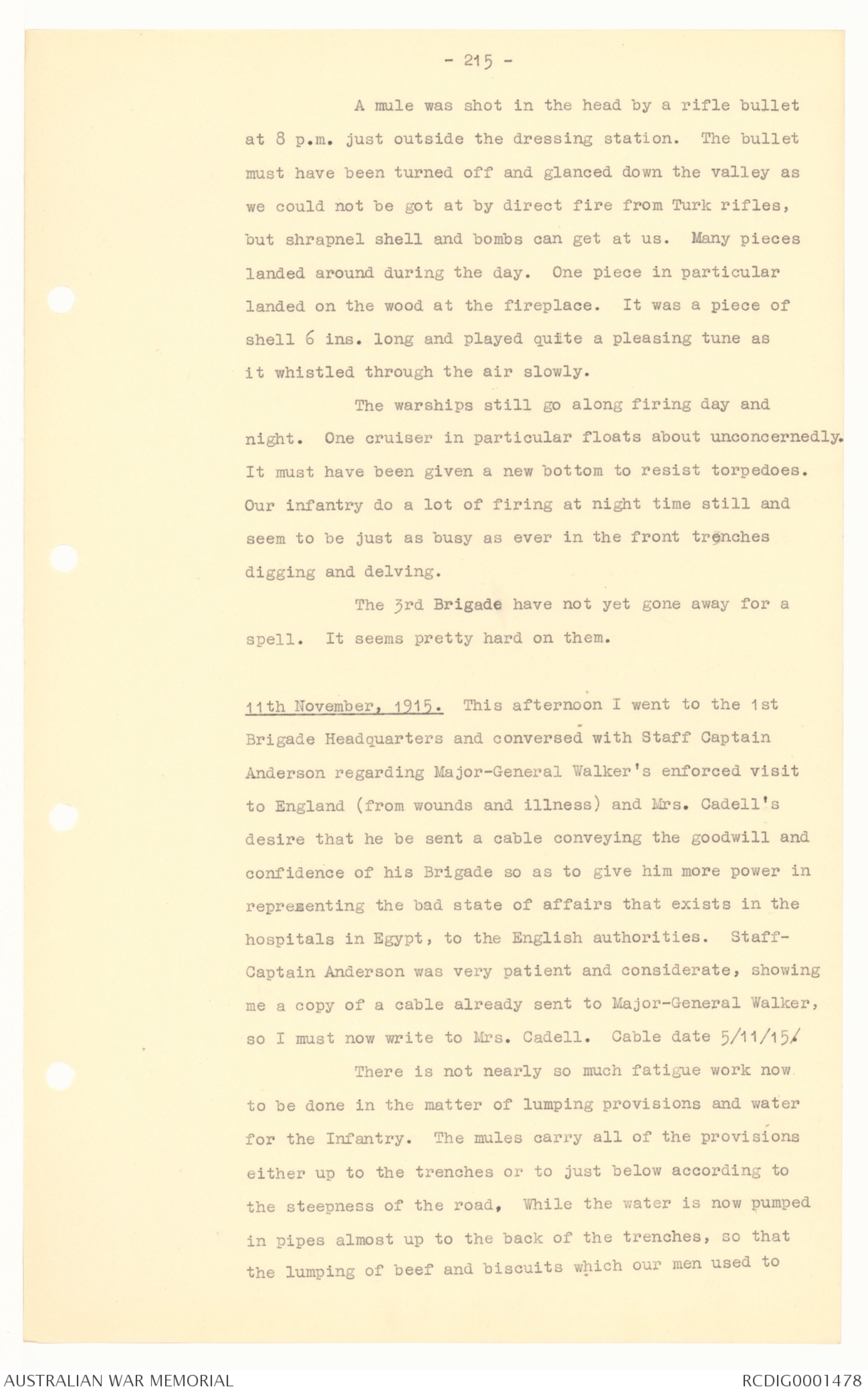
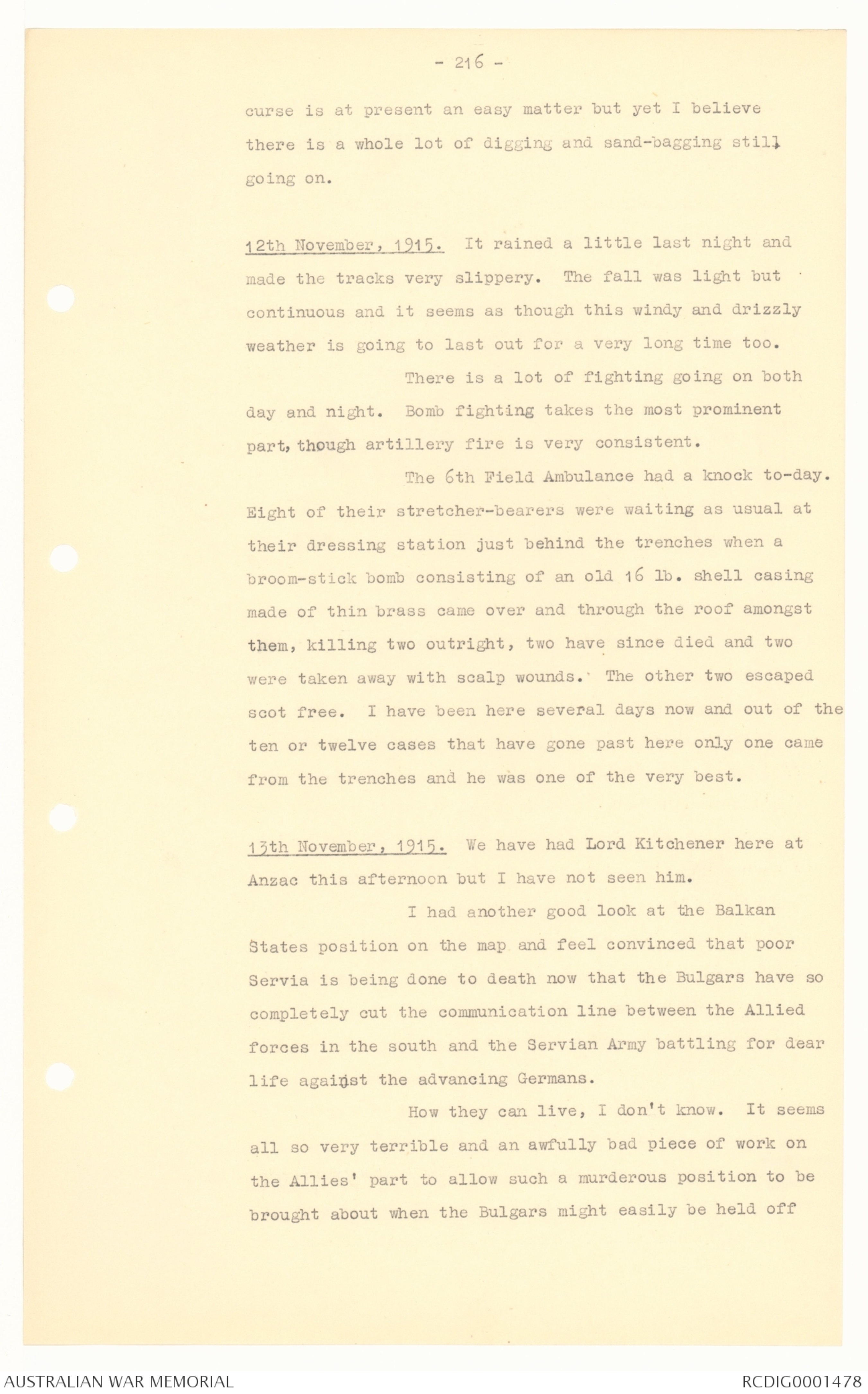
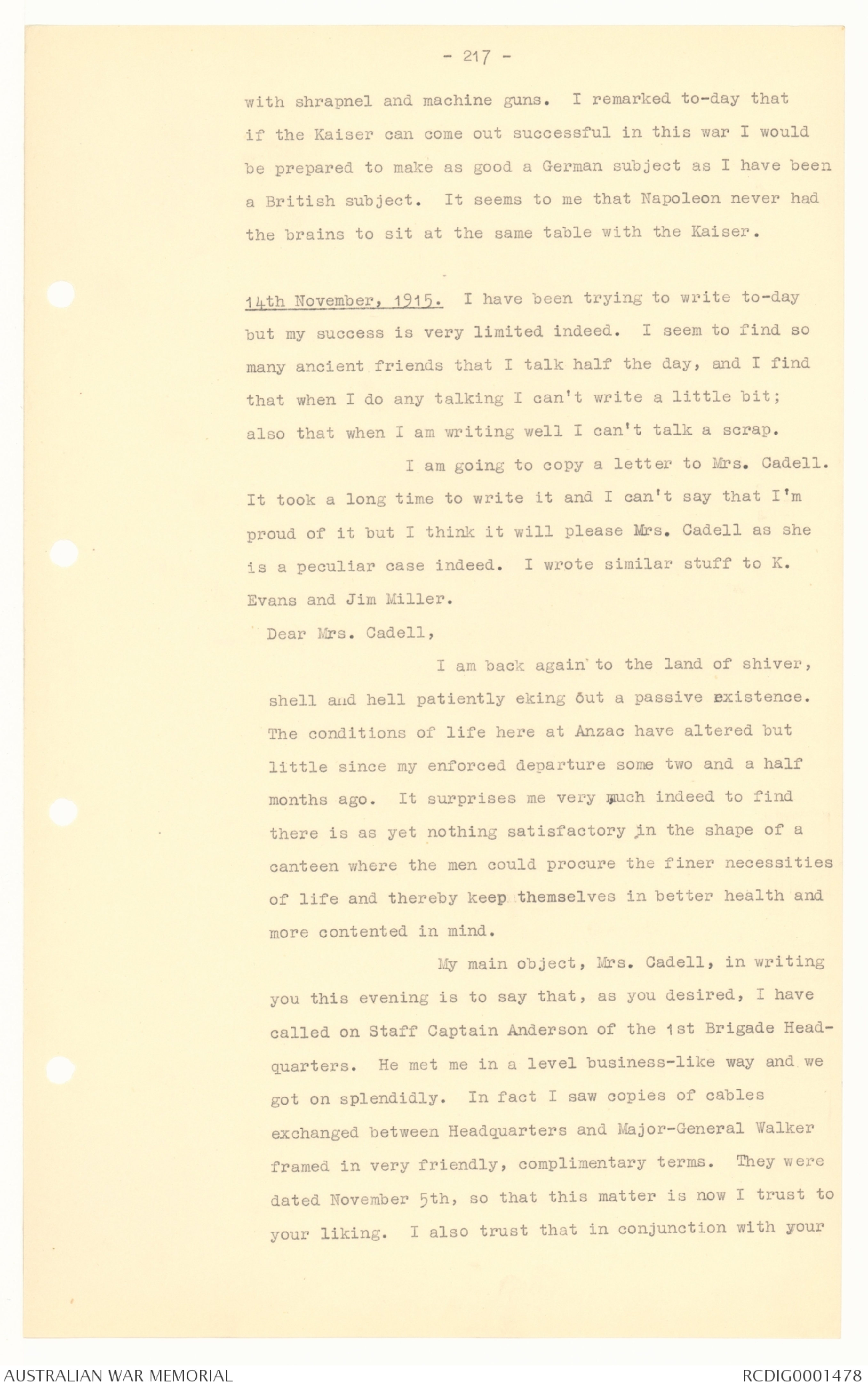
- 208 -
I spent all day in camp, going out to Palais at
5.30 to wait for her fruitlessly. I went out to Montazah
grounds and walked about from 7 until 10 p.m. in the dark
and then came home to camp by the 10.20 train. It was a
hard but valuable experience to be waiting around in the
dark for three hours and hiding every now and again to
avoid detection. The night was still and hot, dew fell
heavily and though the stars shone brilliantly there was
every indication of rain ere morning broke. It is a
strange feeling to be silently waiting, listening to every
sound, and be from time to time startled by the peculiar
lapping of the sea amongst the rocks and sea-wall. There
was nothing heard of birds and animals which is peculiar
to this country of Egypt.
31st October, 1915. Two more months only to New Year.
It's truly wonderful what I have gone through since the
last year. A little ray of heaven but a whole lot of hell.
Hell that would make even Dante blush at his own shortcomings.
I wrote eight letters and to my surprise
seven of them were to women of some kind - married or
single. I should, I know, damned well stick more to my men
friends as they are likely one day to be of service to me,
whereas the women, though consoling, are more sentimental
than solid.
I sent Mrs. Hynes a cheque for £2 and will send
Ruth £1.1/- for Xmas.
I am getting used to this hanging about day
after day, dodging as much work as is possible, even to
the extent of not going on parade at all, so as to be
assured of ^not being caught for guard duties. This guard
duty stuff does break my heart. Ordinary, or useful work
I don’t at all mind but to be just mouching about hour
after hour with a gun and a bayonet seems ridiculous to me.
- 209 -
I can't afford the waste of time.
1st November, 1915. To-day is the anniversary of our
leaving Albany twelve months ago. What a morning that was !
How silent all appeared and how, without anything of a
hitch, those 40 to 50 transports and warships glided about.
It was trying and pathetically solemn. Tears filled my
eyes as a woman in a motor boat (the only woman to see we
30,000 or more men come away to slaughter) waved us good-bye
and God's speed with her dainty little handkerchief. It
all seemed sad and sickening.
A concert and general celebration was held
in the Sergeants' mess to-night. With smoking, singing,
drinking and speech-making they went well up to 12 o'clock.
I did not know whether to feel they were doing the correct
thing or not, and yet I went to bed with a very heavy heart.
I made enquiries about good old George
Hill and find that he died at No. 19 General Hospital,
Alexandria, on July 16th and was buried at Chatby
Cemetery. He died in G. Ward and his grave number is 1180.
I took some photos. of the hospital and grounds. This is a
fine building erected by the Germans as a hospital.
I waited and saw two trains from Montazah
arrive at Alexandria but no luck.
2nd November, 1915. I went on parade this morning for the
first time in three days only to find that my name is not
on the roll book. This gives me plenty of liberty and means
that I can miss the next batch overseas if I remain silent.
I am now sitting over at the canteen upstairs writing.
It's a pleasant and reasonably safe place to be. My
writing takes the melancholy turn just now and I draw
heavily upon the coming back from the "wilds and region of
the devil" to civilization and the glory of feminine intercourse.
- 210 -
I did not go up for pay yesterday as my book
is now some £3 overdrawn.
I was warned amongst a batch of 92 men to be
ready to proceed overseas to-morrow morning at 7.20 o'clock.
I do not grumble. I've had a very good time indeed and have
to be thankful in the first place for getting past Lemnos
Island and also for the good people I have since met, so
I return with a willing heart and glad that I did not get
into the transport section.
I failed to get the train for Montazah/but went
up town, and had a good dinner.
3rd November, 1915. I got in last night after 12 o'clock.
I did quite a lot of shopping and wandered about the beer
shanty and brothel quarter while they were attempting to
close up and eject the nilly-willy soldier element.
The military picket were busy in large numbers with big
motor cars helping to clean up the streets. The bad cases
they took to the "clinck" and others who would not go,
were sent home. This performance commences at 9 o'clock
and goes on until the pubs are all in peace and closed at
10 o'clock. In fact I believe that all sales of liquor
is now absolutely prohibited anywhere in Alexandria after
10 p.m.
About 10.30, quite alone, I went up to the
Casino where the second nightly performance had only
commenced. The big building was filled with people only
a few of whom were soldiers. The show, particularly the
Kennedy girls, was good to me. (These girls are English
but very popular on account of their little song "Australia
will be there." They have been running for a long time in
Alexandria. On entering the camp grounds the English
pickets persisted in challenging me, whereas the Australian
pickets had nothing to say at all.
- 211 -
I rose early to get packed up and have
breakfast for the 7.20 "fall in." With water bottle and
pack up I got there in time. The riflemen were issued with
90 rounds of ammunition; and we were marched off for the
tram-sheds where we waited an hour during which time Mrs.
Cadell came along and made me promise much. At the wharf we
lolled about for 1½ hours and then went aboard the
"Transylvania", a 16,000 tonner. There are aboard all told
1,700 men including 115 Australians and 65 New Zealanders.
Our berthing accommodation is right down at the bottom of
the ship and in consequence is stuffy and smelly.
We waited bo board until 6 o'clock and then proceeded
to sea. Under good steam the lights of Alexandria
soon disappeared and before long I had my blanket arranged on
the deck for sleep, thinking but little of the probable
seriousness of the voyage and its ultimate consequences.
All of the men seem very matter of fact and were in no way
affected. My thoughts, for some unexplainable reason, ran
sentimentally towards Montazah and what I have experienced
about there. It's all so very strange; yes, strange indeed.
4th November, 1915. We are travelling well, despite the
rumour that there is a submarine following us. The rumour,
of course, had to come sooner or later. Such scares are
always expected so we paraded at 4 p.m. with lifebelts on
and had the boats pointed out to us. We know there are
submarines in these waters so we must be prepared for the
worst, but even torpedoes do not bother us much after our
Gallipoli experiences. The food item and arrangements are
in a very bad way at present, but then it is only for a
few hours so it doesn't much matter, although by the wayward
course we have been steering all this day our journey
will be much longer than 400 miles.
I was mess orderly at dinner time and the
waking-up part of it came very hard. At tea time it was
- 212 -
much easier but nevertheless a bit of a come-down after
the waiting on I have had for the past twelve weeks
(from August 14th to November 4th) but I am sure to
experience many more shocks before long. I slept on the
winch deck in a well exposed position and I got damn
cold before morning. Still I got up with a clear head
which is more than I would have had sleeping in the
stuffy compartments below.
5th November, 1915. It is surprising how quickly the
weather changes with a few miles travelling northward.
Why, to-day is very different to the heat of Alexandria.
If the change continues cold, I will have to secure a
longer pair of pants.
We were on parade this morning just hanging
around for an hour, nothing doing at all.
I have been trying to read but can't. Neither
can I write as the deck vibrates and anyhow my head is
not quite right, on board ship again I expect. Anyhow
there is hardly any motion in the sea and our ship is a
big one.
Submarine guards are posted with rifles everywhere
around and we are warned to carry life-belts with us
all day long.
6th November, 1915. At 5 o'clock this evening we ran into
the Harbour at Mudros, being escorted all day by a cheeky
little destroyer. There are a lot of steamers about but
only a few warships. There are some hundreds of tents
about the mainland now, making it look like a huge encampment.
- 213 -
7th November, 1915. I am packed up again but in an anxious
state on account of not knowing whether we land at Lemnos
or go on to Gallipoli. My black kit bag in consequence is
a matter of much concern as it contains a few things that
I want in the cold weather.
We draw iron rations at 9 a.m.. For what
purpose I can't tell or even guess other than a hurried
push off to Gallipoli and I am not too keen on it. I wish
it were Greece.
The weather is jolly cold at night time and
my bunk on the poop deck last night was hardly comfortable.
The heavy dew which lay thick all around until 9 a.m. made
my blankets quite wet and sodden.
Tonight I will write home though there is so
little to say now that our movements are so uncertain, and
Mother will not be pleased to think of me going back to
the bloodshed and slaughter of Gallipoli. Anyhow I am
going to sleep downstairs ( a long way down too) tonight
and leave providence to attend and protect me. It's useless
to worry.
8th November, 1915. At 1 o'clock to-day we "A" class men
transhipped into a smaller craft from the "Transylvania,"
while the "B" class men went ashore. We hung around the
harbour and at 4 p.m. steamed outside and headed full steam
for the east - Anzac Cove - where we arrived at 10 o'clock
without any adventure to recall other than an interesting cha
chat with a Victorian artilleryman and a few biscuits washed
down with a small but good bottle of beer.
There were some 115 Australians aboard the
"Transylvania" and sad though it is to relate there were
several cases of venereal disease broke out, and I believe
there are hundreds of cases of the worst possible kind in
the Cairo Isolation area. It seems to me that there is
something very wrong with the upbringing of our youth when
- 214 -
they are not taught to take care of themselves against
so dread a disease. It is sheer ignorance that causes
the trouble in most cases - young fellows who have never
heard of its terrible ravages. I have to a large extent
to be thankful to Dr. T. E. Butler for his long letter on
venereal loathsomeness of some years ago now.
9th November, 1915. We came ashore at Anzac at 2 o'clock
this morning and camped in an infernally cold dug-out until
7 o'clock, when I set off in search of my unit and discovered
that they were still at Lemnos Island. I then gave
myself up to the D.A.D.M.S. and he signed me up temporarily
with 2nd Light Horse Field Ambulance. After dinner I was
taken up to a dressing station and put in charge of it.
There are two stretcher bearers with me. They are changed
every 24 hours but I am expected to remain here all the
time. The post fortunately is not a very busy one so that
I anticipate having quite a lot of time on my hands, which
I hope to use to educational advantages.
Bob Thompson is cooking with the 2nd. I
had a good breakfast and dinner with him and will in future
do alright in this direction, I am sure.
Greatly to my surprise, there is no decent
canteen here as yet and such essentials as chocolate, milk,
biscuits etc. are very difficult to procure. This is a
miserable matter to my way of thinking. Give the fellows
something like they are used to in camp at least, and they
will work with a better heart and die happier.
10th November, 1915. I have cleaned up my station
thoroughly, and at dinner time I feel more at ease and
contented with my lot. To-day passed off without my
getting a solitary case to attend other than my own forefinger
which I hit with the axe while chopping wood.
- 215 -
A mule was shot in the head by a rifle bullet
at 8 p.m. just outside the dressing station. The bullet
must have been turned off and glanced down the valley as
we could not be got at by direct fire from Turk rifles,
but shrapnel shell and bombs can get at us. Many pieces
landed around during the day. One piece in particular
landed on the wood at the fireplace. It was a piece of
shell 6 ins. long and played quite a pleasing tune as
it whistled through the air slowly.
The warships still go along firing day and
night. One cruiser in particular floats about unconcernedly.
It must have been given a new bottom to resist torpedoes.
Our infantry do a lot of firing at night time still and
seem to be just as busy as ever in the front trenches
digging and delving.
The 3rd Brigade have not yet gone away for a
spell. It seems pretty hard on them.
11th November, 1915. This afternoon I went to the 1st
Brigade Headquarters and conversed with Staff Captain
Anderson regarding Major-General Walker's enforced visit
to England (from wounds and illness) and Mrs. Cadell's
desire that he be sent a cable conveying the goodwill and
confidence of his Brigade so as to give him more power in
representing the bad state of affairs that exists in the
hospitals in Egypt, to the English authorities. Staff-Captain
Anderson was very patient and considerate, showing
me a copy of a cable already sent to Major-General Walker,
so I must now write to Mrs. Cadell. Cable date 5/11/15/.
There is not nearly so much fatigue work now
to be done in the matter of lumping provisions and water
for the Infantry. The mules carry all of the provisions
either up to the trenches or to just below according to
the steepness of the road. While the water is now pumped
in pipes almost up to the back of the trenches, so that
the lumping of beef and biscuits which our men used to
- 216 -
curse is at present an easy matter but yet I believe
there is a whole lot of digging and sand-bagging still
going on.
12th November, 1915. It rained a little last night and
made the tracks very slippery. The fall was light but
continuous and it seems as though this windy and drizzly
weather is going to last out for a very long time too.
There is a lot of fighting going on both
day and night. Bomb fighting takes the most prominent
part, though artillery fire is very consistent.
The 6th Field Ambulance had a knock to-day.
Eight of their stretcher-bearers were waiting as usual at
their dressing station just behind the trenches when a
broom-stick bomb consisting of an old 16 lb. shell casing
made of thin brass came over and through the roof amongst
them, killing two outright, two have since died and two
were taken away with scalp wounds. The other two escaped
scot free. I have been here several days now and out of the
ten or twelve cases that have gone past here only one came
from the trenches and he was one of the very best.
13th November, 1915. We have had Lord Kitchener here at
Anzac this afternoon but I have not seen him.
I had another good look at the Balkan
States position on the map and feel convinced that poor
Servia is being done to death now that the Bulgars have so
completely cut the communication line between the Allied
forces in the south and the Servian Army battling for dear
life against the advancing Germans.
How they can live, I don't know. It seems
all so very terrible and an awfully bad piece of work on
the Allies' part to allow such a murderous position to be
brought about when the Bulgars might easily be held off
- 217 -
with shrapnel and machine guns. I remarked to-day that
if the Kaiser can come out successful in this war I would
be prepared to make as good a German subject as I have been
a British subject. It seems to me that Napoleon never had
the brains to sit at the same table with the Kaiser.
14th November, 1915. I have been trying to write to-day
but my success is very limited indeed. I seem to find so
many ancient friends that I talk half the day, and I find
that when I do any talking I can’t write a little bit;
also that when I am writing well I can't talk a scrap.
I am going to copy a letter to Mrs. Cadell.
It took a long time to write it and I can't say that I'm
proud of it but I think it will please Mrs. Cadell as she
is a peculiar case indeed. I wrote similar stuff to K.
Evans and Jim Miller.
Dear Mrs. Cadell,
I am back again to the land of shiver,
shell and hell patiently eking out a passive existence.
The conditions of life here at Anzac have altered but
little since my enforced departure some two and a half
months ago. It surprises me very much indeed to find
there is as yet nothing satisfactory in the shape of a
canteen where the men could procure the finer necessities
of life and thereby keep themselves in better health and
more contented in mind.
My main object, Mrs. Cadell, in writing
you this evening is to say that, as you desired, I have
called on Staff Captain Anderson of the 1st Brigade Headquarters.
He met me in a level business-like way and we
got on splendidly. In fact I saw copies of cables
exchanged between Headquarters and Major-General Walker
framed in very friendly, complimentary terms. They were
dated November 5th, so that this matter is now I trust to
your liking. I also trust that in conjunction with your
 Beverley Pagano
Beverley PaganoThis transcription item is now locked to you for editing. To release the lock either Save your changes or Cancel.
This lock will be automatically released after 60 minutes of inactivity.